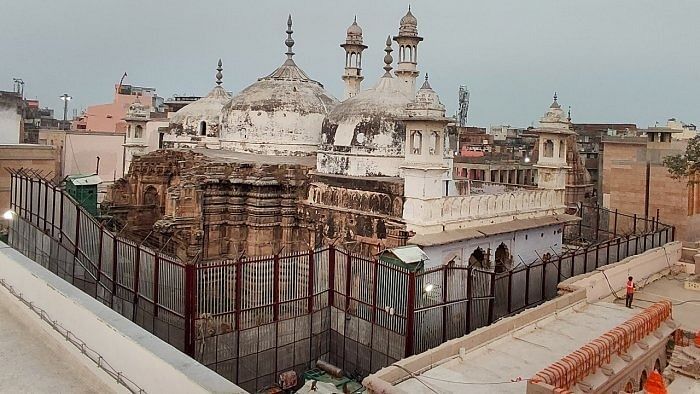
Gyanvapi mosque.
Credit: PTI Photo
Lucknow: A Varanasi court on Wednesday completed hearing on the application by Hindu plaintiffs seeking a scientific survey of the entire Gyanvapi mosque premises by the Archaeological Survey of India (ASI).
Civil judge senior division fast track court Jugal Shambhu fixed September 18 for hearing the response of the Anjuman Intezamiya Committee, which looks after the mosque, on the application of the Hindu plaintiffs. The Hindu plaintiffs, who claim that a temple existed prior to the mosque, have sought a survey using machines, and have called for the digging up of the premises to search for evidence in support of their claim.
The Hindu plaintiffs contended in their application that there existed a shivalinga below the main done of the mosque.
The lawyer for the Hindu plaintiffs, Vijay Shankar Rastogi, also claimed that there used to be a continuous flow of water over the shivalinga from the water collected in what he said was 'Gyan Kund'.
"A scientific survey of the entire Gyanvapi mosque premises is essential to find out the evidence ... digging is required with machines " Rastogi said.
He said that though the ASI had conducted a scientific survey of a portion of the mosque, that survey was not sufficient. "Machines were not used ... digging was also not done," he said.
A Varanasi court had last year allowed a plea for a scientific survey of the mosque premises by the ASI but it said that the 'wazukhana' ( a place used by the Muslims to wash their hands before offering prayers) would not be surveyed.
The application of the Hindu plaintiffs have sought a scientific survey of the 'wazukhana'.
Later, the lawyer of the Hindu plaintiffs in the Kashi VishwanathTemple-Gyanvapi Mosque case claimed that the ASI report stated there was evidence that a Hindu temple existed on the mosque site and that the mosque had been built after demolishing a Hindu temple in the 17th century.
The Muslim side, however, refuted the assertions and said that there was no conclusive evidence to this effect.
The survey of the Gyanvapi mosque premises had been undertaken after the Allahabad High Court rejected the petition filed by the Muslim litigants seeking a stay on the Varanasi court's order for a scientific survey by the ASI. The Supreme Court had also refused to stay the survey.